Unit 4 Problems and advice 汉译英 专练(含解析)牛津深圳·广州版 英语九年级上册
文档属性
| 名称 | Unit 4 Problems and advice 汉译英 专练(含解析)牛津深圳·广州版 英语九年级上册 | 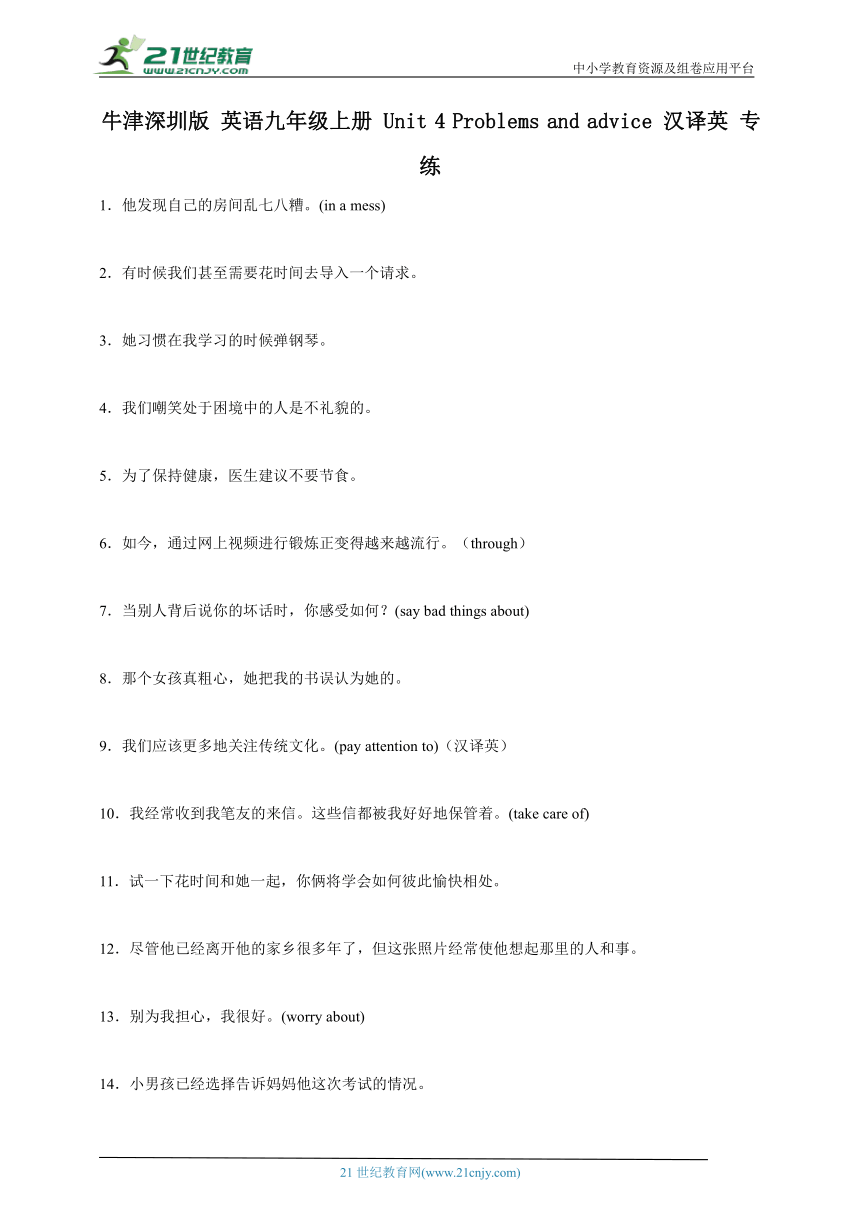 | |
| 格式 | docx | ||
| 文件大小 | 286.3KB | ||
| 资源类型 | 试卷 | ||
| 版本资源 | 牛津深圳版 | ||
| 科目 | 英语 | ||
| 更新时间 | 2023-09-21 16:04:09 | ||
图片预览

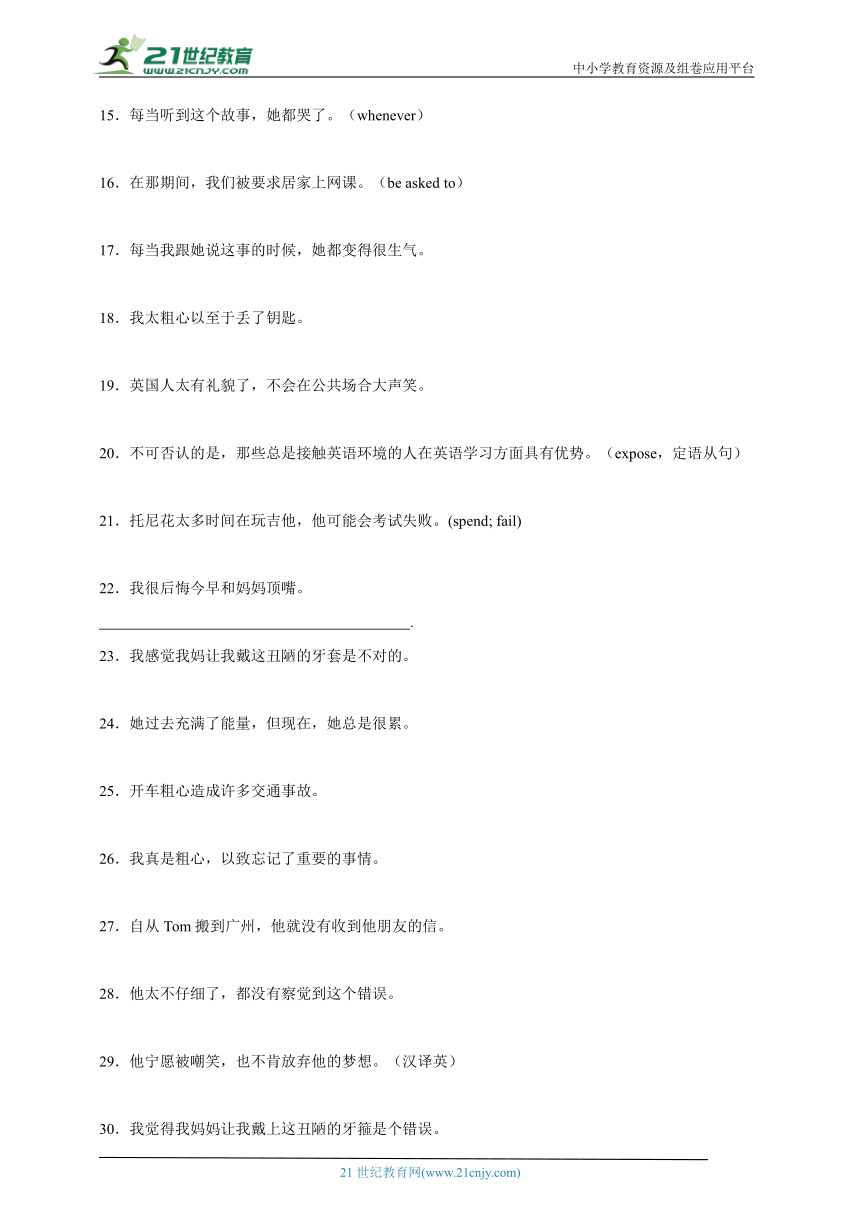
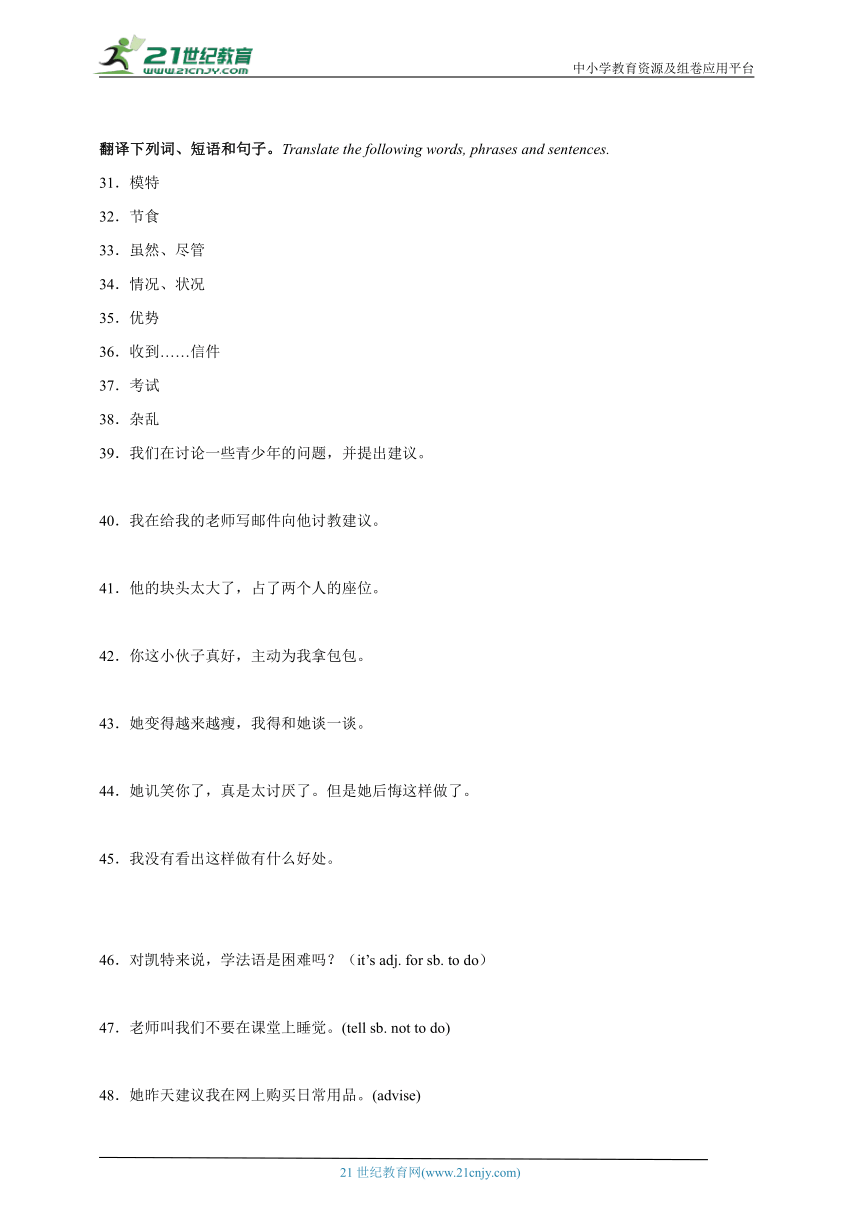
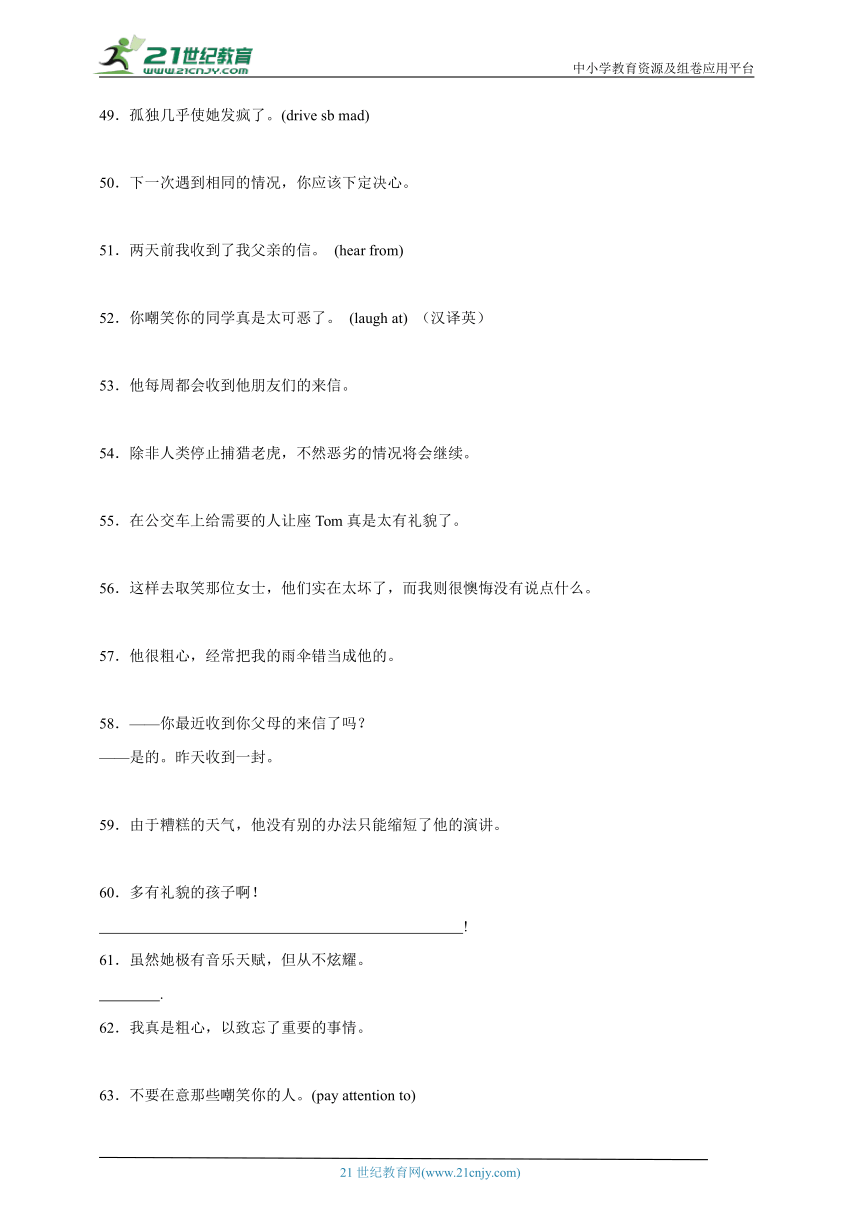
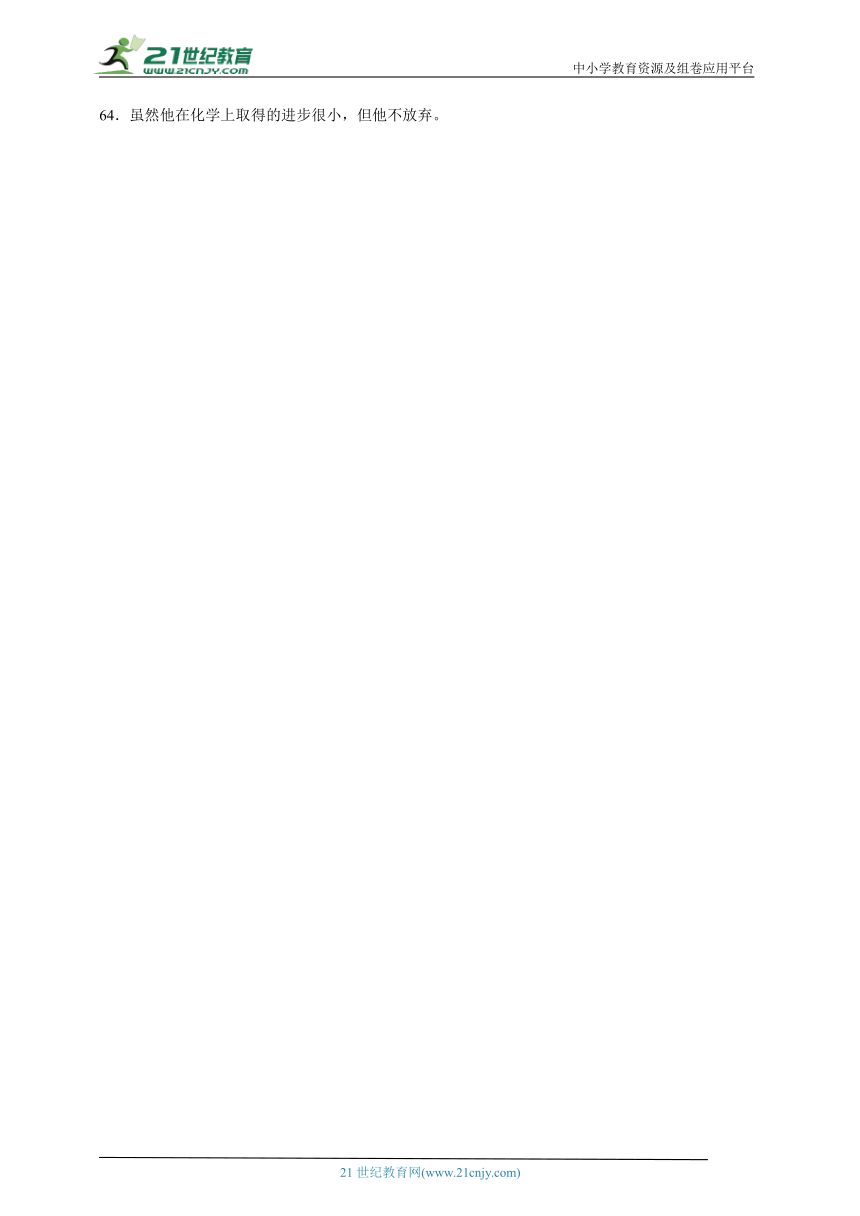
文档简介
中小学教育资源及组卷应用平台
牛津深圳版 英语九年级上册 Unit 4 Problems and advice 汉译英 专练
1.他发现自己的房间乱七八糟。(in a mess)
2.有时候我们甚至需要花时间去导入一个请求。
3.她习惯在我学习的时候弹钢琴。
4.我们嘲笑处于困境中的人是不礼貌的。
5.为了保持健康,医生建议不要节食。
6.如今,通过网上视频进行锻炼正变得越来越流行。(through)
7.当别人背后说你的坏话时,你感受如何?(say bad things about)
8.那个女孩真粗心,她把我的书误认为她的。
9.我们应该更多地关注传统文化。(pay attention to)(汉译英)
10.我经常收到我笔友的来信。这些信都被我好好地保管着。(take care of)
11.试一下花时间和她一起,你俩将学会如何彼此愉快相处。
12.尽管他已经离开他的家乡很多年了,但这张照片经常使他想起那里的人和事。
13.别为我担心,我很好。(worry about)
14.小男孩已经选择告诉妈妈他这次考试的情况。
15.每当听到这个故事,她都哭了。(whenever)
16.在那期间,我们被要求居家上网课。(be asked to)
17.每当我跟她说这事的时候,她都变得很生气。
18.我太粗心以至于丢了钥匙。
19.英国人太有礼貌了,不会在公共场合大声笑。
20.不可否认的是,那些总是接触英语环境的人在英语学习方面具有优势。(expose,定语从句)
21.托尼花太多时间在玩吉他,他可能会考试失败。(spend; fail)
22.我很后悔今早和妈妈顶嘴。
.
23.我感觉我妈让我戴这丑陋的牙套是不对的。
24.她过去充满了能量,但现在,她总是很累。
25.开车粗心造成许多交通事故。
26.我真是粗心,以致忘记了重要的事情。
27.自从Tom搬到广州,他就没有收到他朋友的信。
28.他太不仔细了,都没有察觉到这个错误。
29.他宁愿被嘲笑,也不肯放弃他的梦想。(汉译英)
30.我觉得我妈妈让我戴上这丑陋的牙箍是个错误。
翻译下列词、短语和句子。Translate the following words, phrases and sentences.
31.模特
32.节食
33.虽然、尽管
34.情况、状况
35.优势
36.收到……信件
37.考试
38.杂乱
39.我们在讨论一些青少年的问题,并提出建议。
40.我在给我的老师写邮件向他讨教建议。
41.他的块头太大了,占了两个人的座位。
42.你这小伙子真好,主动为我拿包包。
43.她变得越来越瘦,我得和她谈一谈。
44.她讥笑你了,真是太讨厌了。但是她后悔这样做了。
45.我没有看出这样做有什么好处。
46.对凯特来说,学法语是困难吗?(it’s adj. for sb. to do)
47.老师叫我们不要在课堂上睡觉。(tell sb. not to do)
48.她昨天建议我在网上购买日常用品。(advise)
49.孤独几乎使她发疯了。(drive sb mad)
50.下一次遇到相同的情况,你应该下定决心。
51.两天前我收到了我父亲的信。 (hear from)
52.你嘲笑你的同学真是太可恶了。 (laugh at) (汉译英)
53.他每周都会收到他朋友们的来信。
54.除非人类停止捕猎老虎,不然恶劣的情况将会继续。
55.在公交车上给需要的人让座Tom真是太有礼貌了。
56.这样去取笑那位女士,他们实在太坏了,而我则很懊悔没有说点什么。
57.他很粗心,经常把我的雨伞错当成他的。
58.——你最近收到你父母的来信了吗?
——是的。昨天收到一封。
59.由于糟糕的天气,他没有别的办法只能缩短了他的演讲。
60.多有礼貌的孩子啊!
!
61.虽然她极有音乐天赋,但从不炫耀。
.
62.我真是粗心,以致忘了重要的事情。
63.不要在意那些嘲笑你的人。(pay attention to)
64.虽然他在化学上取得的进步很小,但他不放弃。
参考答案:
1.He found his room (was) in a mess.
【详解】“他”译为“he”,首字母大写;“发现”译为“find”;“他自己的房间”译为“his room”;“乱七八糟”译为“in a mess”;根据语境,可知这件事发生在过去。用一般过去时,“find”过去式为“found”。“find”后面加名词做宾语,加介词短语做宾补;也可以加省略“that”引导的从句,从句为“His room was in a mess.” 故填He found his room (was )in a mess.
2.Sometimes we even need to spend time leading into a request.
【详解】有时候:sometimes;甚至:even;需要做某事:need to do sth.;花费时间做某事:spend time doing sth.;导入一个请求:lead into a request。由语境可知,时态用一般现在时,主语“we我们”为第一人称,谓语动词need用原形。故填Sometimes we even need to spend time leading into a request.
3.She has a habit of playing the piano when I’m studying.
【详解】“她”为she,主格代词;“有”为have;“一个弹钢琴的习惯”为a habit of playing the piano;“当……时候”为when,引导时间状语从句;“我”为I,主格代词;“学习”为study。结合语境可知,主句应用一般现在时,主语“she”为第三人称单数形式,动词应用单三式has;从句应用现在进行时(be doing),主语“I”是第一人称,be动词用am,study的现在分词是studying。故填She has a habit of playing the piano when I’m studying.
4.It’s impolite of us to laugh at those people in trouble.
【详解】“某人做某事是……的”It’s adj. of sb. to do sth.;“不礼貌的”impolite;“我们”,用于of之后用宾格us;“嘲笑”laugh at;“处于困境中的人”those people in trouble。故填It’s impolite of us to laugh at those people in trouble.
5.In order to keep fit, the doctor suggests not going on a diet.
【详解】in order to为了;keep fit保持健康;the doctor医生;suggest not doing sth建议不要做某事,主语是第三人称单数,谓语动词用三单形式;go on a diet节食。故填In order to keep fit, the doctor suggests not going on a diet.
6.Nowadays, exercising through online videos is becoming more and more popular.
【详解】nowadays“如今”;exercise“锻炼”,此处是作主语,应用动名词;through“通过”;online videos“网上视频”;become“变得”,根据句意可知此处是现在进行时,动词用现在分词;more and more popular“越来越流行”。故填Nowadays, exercising through online videos is becoming more and more popular.
7.How do you feel when others say bad things about you behind your back
【详解】“如何”how;“你”you;“感觉”feel;“当……时候”when,引导时间状语从句;“别人”others;“说你的坏话”say bad things about you;“在你的背后”behind your back。结合语境可知,此句应用一般现在时,主句主语“you”是第二人称,故助动词应用do;从句主语“others”是复数形式,故动词应用原形。故填How do you feel when others say bad things about you behind your back
8.The girl was so careless that she mistook my book for hers./It was careless of the girl to mistake my book for hers.
【详解】“那个女孩”“the girl”;“真粗心”“so careless”;“她”“she”;“把……误认为……”“mistake…for…”;“我的书”“my book”;“她的”“hers”,相当于“her book”。根据语境可知事情发生在过去,句子是一般过去时;本句用so…that引导结果状语从句,表示“如此……以至于……”,可译为The girl was so careless that she mistook my book for hers;结合句意结构,本句适用固定句型“It is/was +形容词+ of sb. +不定式+其他”结构,表示“对某人来说做某事是……的”,it作形式主语,后面的不定式是真正主语,可译为It was careless of the girl to mistake my book for hers。综合以上分析,故填The girl was so careless that she mistook my book for hers./It was careless of the girl to mistake my book for hers.。
9.We should pay more attention to traditional culture.
【详解】we“我们”;should“应该”,情态动词,后接动词原形;pay more attention to“更多地关注”;traditional culture“传统文化”,故填We should pay more attention to traditional culture.
10.I often hear from my pen friends. The letters are taken good care of by me.
【详解】我:I;经常:often;收到……的来信:hear from;我笔友:my pen friends;有标志词often,此句为一般现在时。这些信:these letters;保管:take care of;都被我好好地保管着,应该是被动语态,these letters做主语,谓语动词选择are,take过去分词,taken;被我:by me。故填I often hear from my pen friends. The letters are taken good care of by me.
11.Try spending some time with her and you’ll both learn how to live happily with each other.
【详解】根据汉意可知,该句结构为“祈使句+and+陈述句”;try doing sth.“试着做某事”;spend“花费”,spend some time with sb.“花时间和某人在一起”,her“她”,宾格放在介词with后;you’ll both“你俩将”;learn“学会”;how to live happily with each other“如何彼此愉快相处”,“疑问词+不定式”作learn的宾语。故填Try spending some time with her and you’ll both learn how to live happily with each other.
12.Though he has been away from his hometown for many years, this photo often reminds him of the people and things there.
【详解】根据汉语提示可知,这是“though”引导的让步状语从句,而且不和but连用。从句的主语是“he”,是单数概念;表达“已经离开”谓语动词是现在完成时,用“has been away from”。表达“他的家乡”用形容词性物主代词“his”和名词“hometown”,表达“很多年”用时间状语“for many years”。主句的主语是“这张照片”用指示代词“this”和名词“photo”;表达“经常”用频度副词“often”,放在实义动词的前面。表达“使某人想起”用动词短语“remind sb. of sth.”。主语是单数概念,动词用三单形式“reminds”。表达“他”用人称代词的宾格“him”。宾语是“人和事”,翻译为“the people and things”,表达“那里”用副词“there”。故填Though he has been away from his hometown for many years, this photo often reminds him of the people and things there.
13.Don’t worry about me. I’m very well.
【详解】worry about sb“担心某人”,结合中文提示可知,句子是否定的祈使句,应以don’t开头,me“我”,I’m very well“我很好”,此处的well是形容词,表示身体健康的,故填Don’t worry about me. I’m very well.
14.The little boy has chosen to tell his mother about the exam.
【详解】the little boy小男孩,has chosen to to sth已经选择作某事,tell his mother about the exam.告诉妈妈他这次考试的情况。故填The little boy has chosen to tell his mother about the exam.
15.She cries whenever/no matter when she hears the story.
【详解】每当:whenever/no matter when;听到:hear;哭:cry。结合语境可知,句子应用whenever引导让步状语从句,且时态应用一般现在时,主语she是第三人称单数,谓语动词也应用三单形式。故填She cries whenever/no matter when she hears the story.
16.During that period, we were asked to have classes online at home.
【详解】根据中文句意可知,During that period“在那期间”;be asked to do“被要求做”;have classes online“上网课”;at home“在家”。本句为陈述句,陈述一个过去的事情,使用一般过去时。主语为we,使用be动词were。故填During that period, we were asked to have classes online at home.
17.Whenever I told her about this, she got angry.
【详解】每当……的时候“whenever”;我跟她说这事“I tell her about this”;她“she”;变得很生气“get angry”。结合语境应用一般过去时,所以动词tell变成过去式told,get变成过去式got。故填Whenever I told her about this, she got angry.
18.I was so careless that I lost keys.
【详解】“太……以至于……”so...that...,引导结果状语从句,so后修饰形容词或副词,that后跟从句;根据汉语可知,主从句时态都用一般过去时;“我”I,作主语,be动词用was;“粗心的”careless;“丢了”lose,过去式为lost;“钥匙”keys。故填I was so careless that I lost keys.
19.British people are too polite to laugh loudly in public.
【详解】too…to…“太……而不能……”;polite“有礼貌的”;laugh loudly“大声笑”;in public“在公共场合”。故答案为British people are too polite to laugh loudly in public.
20.There is no denying that those who are always exposed to English environment have an advantage in English learning.
【详解】不可否认的是:there is no denying that;总是:always;接触:be exposed to;英语环境:English environment;有优势:have an advantage。在英语学习方面:in English learning。“总是接触英语环境的”作定语修饰“那些人”。那些人是复数,所以be动词用are,关系代词用who。故填There is no denying that those who are always exposed to English environment have an advantage in English learning.
21.Tony is spending too much time playing the guitar, and he may fail his exams.
【详解】Tony“托尼”,作主语;固定句型sb. spend+时间/金钱+ doing sth.“某人花费时间/金钱做某事”;too much“太多”,修饰time“时间”;固定短语play the guitar“弹吉他”;adn“并且”,是并列连词;may“可能”,是情态动词;fail“失败”;his exams“他的考试”。此处用现在进行时表示他这段时间一直在做的事情。故填Tony is spending too much time playing the guitar, and he may fail his exams.
22.I regretted talking back to my mother this morning
【详解】主语是“I”。表达“后悔做某事”用短语“regret doing”。表达“和某人顶嘴”用短语“talk back to”。句子讲述过去的事,是一般过去时。谓语动词用过去式“regretted”,用动名词“talking”作宾语。表达“妈妈”用“my mother”。表达“今早”用“this morning”。故填I regretted talking back to my mother this morning.
23.I feel like my mom did the wrong thing by letting me wear these ugly braces.
【详解】描述自己想法用一般现在时,I我,作主语;feel like感觉,谓语动词,后接宾语从句;my mom我妈妈,作从句主语;do the wrong thing做错事,从句描述过去的事,用一般过去时;by通过;let让,后接人称代词宾格me;let sb do sth让某人做某事;wear these ugly braces戴这丑陋的牙套。故填I feel like my mom did the wrong thing by letting me wear these ugly braces.
24.She used to be full of energy, but now she’s always tired.
【详解】used to do sth“过去常常做某事”;be full of“充满”;energy“能量”;but now“但是现在”;be tired“疲惫的”,always“总是”,后半句用一般现在时,主语she是第三人称,be动词用is,故填She used to be full of energy, but now she’s always tired.
25.Careless driving causes many traffic accidents.
【详解】开车粗心:careless driving,作主语;造成:cause,作谓语;许多:many;交通事故:traffic accidents,作宾语。根据句意可知,此句时态用一般现在时,主语是第三人称单数,谓语动词用三单形式。故填Careless driving causes many traffic accidents.
26.I was so careless that I forgot the important things.
【详解】表示“如此……以至于……”应用so...that...,that引导结果状语从句;粗心:careless;忘记:forget;重要的事情:the important things。主句和从句都用一般过去时。故填I was so careless that I forgot the important things.
27.Tom hasn’t heard from his friend since he moved to Guangzhou.
【详解】根据汉语可知,此句表达从过去某一时间开始延续至今,用现在完成时,since表示“自从”。Tom作主语,hear from收到某人来信,谓语动词;his friend他的朋友;he作从句主语,move to搬到,过去的时态,用过去式。故填Tom hasn’t heard from his friend since he moved to Guangzhou.
28.He was too careless to take notice of/notice the mistake./He was so careless that he didn’t take notice of/notice the mistake.
【详解】根据中文,可知时态为一般过去时。careless“不仔细的”;take notice of/notice“注意”;the mistake“这个错误”。一可用句型:too…to…“太……以至于不能……”;二是用句型:so+形容词+that从句“太……以至于……”,故填He was too careless to take notice of/notice the mistake./He was so careless that he didn’t take notice of/notice the mistake.
29.He would rather be laughed at than give up his dream.
【详解】宁愿做某事,也不做某事:would rather do than do;被嘲笑:be laughed at;放弃他的梦想:give up his dream。故填He would rather be laughed at than give up his dream.
30.I feel it was a mistake for my mother to make me wear these ugly braces.
【详解】I“我”,作主语;feel“觉得”;it is/was a mistake for sb to do sth“某人做某事是个错误”;my mother“我的妈妈”;make sb do sth“使某人做某事”;me“我”;wear“戴上”; these ugly braces“丑陋的牙套”。本句是宾语从句,由语境分析可知,主句是一般现在时,主语是I,谓语用原形;从句是一般过去时,谓语用was。故填I feel it was a mistake for my mother to make me wear these ugly braces.
31.model 32.be on diet 33.though 34.situation 35.advantage 36.hear from 37.exam 38.mess 39.We are discussing some teenagers’ problems and giving advice. 40.I am writing an email to my teacher to ask for advice from him. 41.He is so big that he takes two seats. 42.It is very kind of you young guy to offer to carry the bag for me. 43.She is getting thinner and thinner and I must talk to her about this. 44.It is awful of her to laugh at you. But she regretted doing so. 45.I don’t see any advantage in doing this.
【解析】31.本题考查单词拼写。模特是名词model,故填model。
32.本题考查固定短语。短语:be on diet节食。故填be on diet。
33.本题考查单词拼写。虽然、尽管是连词though,故填though。
34.本题考查单词拼写。情况、状况是名词situation,故填situation。
35.本题考查单词拼写。优势是名词advantage,故填advantage。
36.本题考查固定短语。短语:hear from收到……信件。故填hear from。
37.本题考查单词拼写。考试是名词exam,故填exam。
38.本题考查单词拼写。杂乱是名词mess,故填mess。
39.根据汉语提示“我们在讨论”可知本句是现在进行时的陈述句。主语是we,助动词用are,现在进行时动词要用ing形式,所以讨论是discussing,青少年是可数名词用复数,青少年的是teenagers’,问题是很多问题用复数,而建议是针对于每个问题的建议用单数。故此句的翻译为We are discussing some teenagers’ problems and giving advice.
40.根据汉语提示“我在给我的老师写”可知本句是现在进行时的陈述句。动词写用ing形式writing,email是以元音发音开头的单词前面用不定冠词an,短语:ask for向…请教/询问,from是从…,him是第三人称宾格代指前面的老师,动词不定式作目的状语。故此句的翻译是I am writing an email to my teacher to ask for advice from him.
41.根据汉语提示可知本句是一般现在时的陈述句。so…that...意为“如此…以至于…”,so是副词,常用来修饰形容词和副词,that引导结果状语从句。块头大用形容词big,that后面从句的主语是he,所以谓语动词用第三人称单数takes,两个座位是复数所以是two seats。故此句的翻译是He is so big that he takes two seats.
42.根据汉语提示可知本句是一般现在时的陈述句。It's+adj. +of sb. to do sth.做某事对某人来说怎么样,短语:It is very kind of you你很善良。offer to do主动做某事,拿包用carry,介词后面接宾格所以用for me。故此句的翻译是It is very kind of you young guy to offer to carry the bag for me.
43.根据汉语提示可知本句中含有比较级和情态动词。越来越…:比较级+and+比较级。越来越瘦用thinner and thinner,must是情态动词后面接动词原形,talk to和谁谈一谈。故此句的翻译是She is getting thinner and thinner and I must talk to her about this.
44.根据汉语提示可知第一句是一般陈述句,第二句用过去时。It is awful 太讨厌了,laugh at 嘲笑,but表示转折,根据汉语提示她后悔应该是过去的事,所以用过去式regretted,regret doing是对做过的事遗憾后悔,根据汉语是做过的,所以用doing。故此句的翻译是It is awful of her to laugh at you. But she regretted doing so.
45.根据汉语提示可知本句是否定句。否定句的助动词后面的动词要用原形,所以是see,any用于否定句中,优势、好处是advantage不可数名词,in doing this是这样做。故此句的翻译是I don’t see any advantage in doing this.
46.Is it difficult for Kate to learn French
【详解】做某事对某人是……的:It’s adj. for sb. to do sth.;困难的:difficult;学法语:learn French;句子用一般现在时,be动词用is,变疑问句时把be动词is放it之前。故填Is it difficult for Kate to learn French
47.The teachers tell us not to sleep in class.
【详解】结合句意,该句用一般现在时。“老师”为“The teachers”,作主语,谓语动词用原形;“告诉某人不要做某事”为tell sb. not to do sth.;“我们”为us,用宾格;“在课堂上睡觉”为sleep in class。故填The teachers tell us not to sleep in class.
48.She advised me to buy daily necessities online yesterday.
【详解】advise sb to do sth“建议某人去做某事”;buy daily necessities online“在网上购买日常用品”;yesterday“昨天”,句子是一般过去时,故填She advised me to buy daily necessities online yesterday.
49.Loneliness almost drives her mad.
【详解】这句话的主语是“孤独”,需要使用名词“孤独”loneliness,谓语动词使用单三形式,短语“使某人发疯”是drive sb mad,副词“几乎”是almost,放在动词前,故填Loneliness almost drives her mad。
50.Next time in the same situation, you should make up your own mind.
【详解】下一次“next time”;遇到相同的情况“in the same situation”;你“you”;应该“should”,其后加动词原形;下定决心“make up one’s own mind”,此处形容词性物主代词用your。故填Next time in the same situation, you should make up your own mind.
51.I heard from my father two days ago.
【详解】根据汉语意思可知,时态是一般过去时,主语I“我”;动词短语hear from sb“收到某人的来信”,所以用动词过去式heard;my father“我父亲”;two days ago“两天前”,故填I heard from my father two days ago.
52.It is awful of you to laugh at your classmate.
【详解】此处应用“It is+adj.+of sb.+to do sth.”的结构,你:you,是宾格,作宾语;可恶:awful,形容词,作表语;嘲笑你的同学:laugh at your classmate。故填It is awful of you to laugh at your classmate.
53.He hears from his friends every week.
【详解】hear from“收到……来信”;his friends“他的朋友们”;every week“每周”,句子是一般现在时,主语he是第三人称,动词用三单形式,故填He hears from his friends every week.
54.The bad situation will continue unless people stop hunting tigers.
【详解】根据汉语意思可知,该句为unless引导的条件状语从句,遵循“主将从现”;the bad situation“恶劣的情况”,作主句主语;will continue“将会继续”,作主句谓语;unless“除非”,引导从句;people“人类”,从句主语;stop“停止”,从句谓语;hunting tigers“捕猎老虎”,从句宾语。故填The bad situation will continue unless people stop hunting tigers.
55.It’s really polite of Tom to offer/give his seat to the people in need on the bus.
【详解】在公交车上:on the bus;给某人提供某物:offer/give sth. to sb.;需要的人:the people in need,in need作后置定语;给需要的人让座:offer/give his seat to the people in need;Tom真是太有礼貌了:It’s really polite of Tom。本句适用“It’s +形容词+ of/for sb. +不定式短语+其他”固定结构,it作形式主语,不定式是真正主语;of 用于指某人的性格、属性、特征等,介词for表示对象,意为“对……来说”;结合语境,句子描述Tom的性格特点,介词用of,故填It’s really polite of Tom to offer/give his seat to the people in need on the bus.
56.It was awful of them to laugh at that lady, and I regretted not saying anything.
【详解】it is/was awful of sb to do sth“某人做某事是糟糕的”;them“他们”;laugh at“嘲笑”;that lady“那位女士”;and“和,又”;I“我”;regret not doing sth“后悔没做某事”;say anything“说点什么”。由语境分析,本句为一般过去时,因此and连接的两个句子的谓语分别用was,regretted。故填It was awful of them to laugh at that lady, and I regretted not saying anything.
57.He is so careless that he often mistakes my umbrella for his.
【详解】careless“粗心的”,形容词作表语;修饰形容词,用so…that引导结果状语从句;mistake for“把……错认为”;my umbrella“我的雨伞”;his“他的雨伞”,句子是一般现在时,故填He is so careless that he often mistakes my umbrella for his.
58.—Have you heard from your parents recently —Yes, I received a letter yesterday.
【详解】hear from sb收到某人的来信;根据“最近”可知问句用现在完成时,主语是you,疑问句需要把have提前;答语用一般过去时进行回答。故填—Have you heard from yours parents recently Yes, I received a letter yesterday.
59.He had no choice but to cut his speech short because of the terrible/awful/bad weather.
【详解】because of因为,由于,后跟名词,代词,动名词或名词性的短语。have no choice but别无选择。在含介词but的句型中,but前有do,则but后的不定式不能带to;相反,but前若找不到do,则but后的不定式必定带to.时态是一般过去时态。故答案为He had no choice but to cut his speech short because of the terrible/awful/bad weather.
考点:考查句子翻译。
60.What a polite child
【详解】polite礼貌的,child孩子,本句强调的中心词是可数名词单数child,所以用“What+a/an+adj+可数名词单数!”句型,polite首字母发辅音音素,What a polite child。
61.Though\Although she has a gift for music, she never shows off
【详解】虽然:though\although;音乐天赋:have a gift for music;从不:never;炫耀:how off。结合语境可知,此题为一般现在时,表述的是客观事实,此句是让步状语从句,引导让步状语从句用though\although。主语she是三单,因此谓语动词使用三单形式,用has和shows。故填Though\Although she has a gift for music, she never shows off。
62.I was so careless that I forgot important things.
【详解】我I,粗心be careless,如此……以致……so...that...,忘了forget,重要的事情important things,时态是一般过去时,动词用过去式。故填I was so careless that I forgot important things.
63.Don’t pay attention to the people who laugh at you.
【详解】 pay attention to注意;laugh at嘲笑;这句话可以写成一个祈使句,短语“不要在意…”是Don't pay attention to…,“那些嘲笑你的人”可以写成定语从句,也就是the people who laugh at you,故答案为: Don’t pay attention to the people who laugh at you.
64.Though he makes little progress in Chemistry, he never gives up./Although he made little progress in Chemistry, he never gave up.
【详解】虽然:although/though;在化学上:in Chemistry;取得的进步很小:make little progress;不放弃:never give up。这里的although/though引导的句子不与but同时连用;此题的时态可以用一般现在时或一般过去时;当用一般现在时的时候,make和give需用第三人称单数形式;若用一般过去时,make需用made,give需用gave。故填Though he makes little progress in Chemistry, he never gives up./Although he made little progress in Chemistry, he never gave up.
21世纪教育网 www.21cnjy.com 精品试卷·第 2 页 (共 2 页)
21世纪教育网(www.21cnjy.com)
牛津深圳版 英语九年级上册 Unit 4 Problems and advice 汉译英 专练
1.他发现自己的房间乱七八糟。(in a mess)
2.有时候我们甚至需要花时间去导入一个请求。
3.她习惯在我学习的时候弹钢琴。
4.我们嘲笑处于困境中的人是不礼貌的。
5.为了保持健康,医生建议不要节食。
6.如今,通过网上视频进行锻炼正变得越来越流行。(through)
7.当别人背后说你的坏话时,你感受如何?(say bad things about)
8.那个女孩真粗心,她把我的书误认为她的。
9.我们应该更多地关注传统文化。(pay attention to)(汉译英)
10.我经常收到我笔友的来信。这些信都被我好好地保管着。(take care of)
11.试一下花时间和她一起,你俩将学会如何彼此愉快相处。
12.尽管他已经离开他的家乡很多年了,但这张照片经常使他想起那里的人和事。
13.别为我担心,我很好。(worry about)
14.小男孩已经选择告诉妈妈他这次考试的情况。
15.每当听到这个故事,她都哭了。(whenever)
16.在那期间,我们被要求居家上网课。(be asked to)
17.每当我跟她说这事的时候,她都变得很生气。
18.我太粗心以至于丢了钥匙。
19.英国人太有礼貌了,不会在公共场合大声笑。
20.不可否认的是,那些总是接触英语环境的人在英语学习方面具有优势。(expose,定语从句)
21.托尼花太多时间在玩吉他,他可能会考试失败。(spend; fail)
22.我很后悔今早和妈妈顶嘴。
.
23.我感觉我妈让我戴这丑陋的牙套是不对的。
24.她过去充满了能量,但现在,她总是很累。
25.开车粗心造成许多交通事故。
26.我真是粗心,以致忘记了重要的事情。
27.自从Tom搬到广州,他就没有收到他朋友的信。
28.他太不仔细了,都没有察觉到这个错误。
29.他宁愿被嘲笑,也不肯放弃他的梦想。(汉译英)
30.我觉得我妈妈让我戴上这丑陋的牙箍是个错误。
翻译下列词、短语和句子。Translate the following words, phrases and sentences.
31.模特
32.节食
33.虽然、尽管
34.情况、状况
35.优势
36.收到……信件
37.考试
38.杂乱
39.我们在讨论一些青少年的问题,并提出建议。
40.我在给我的老师写邮件向他讨教建议。
41.他的块头太大了,占了两个人的座位。
42.你这小伙子真好,主动为我拿包包。
43.她变得越来越瘦,我得和她谈一谈。
44.她讥笑你了,真是太讨厌了。但是她后悔这样做了。
45.我没有看出这样做有什么好处。
46.对凯特来说,学法语是困难吗?(it’s adj. for sb. to do)
47.老师叫我们不要在课堂上睡觉。(tell sb. not to do)
48.她昨天建议我在网上购买日常用品。(advise)
49.孤独几乎使她发疯了。(drive sb mad)
50.下一次遇到相同的情况,你应该下定决心。
51.两天前我收到了我父亲的信。 (hear from)
52.你嘲笑你的同学真是太可恶了。 (laugh at) (汉译英)
53.他每周都会收到他朋友们的来信。
54.除非人类停止捕猎老虎,不然恶劣的情况将会继续。
55.在公交车上给需要的人让座Tom真是太有礼貌了。
56.这样去取笑那位女士,他们实在太坏了,而我则很懊悔没有说点什么。
57.他很粗心,经常把我的雨伞错当成他的。
58.——你最近收到你父母的来信了吗?
——是的。昨天收到一封。
59.由于糟糕的天气,他没有别的办法只能缩短了他的演讲。
60.多有礼貌的孩子啊!
!
61.虽然她极有音乐天赋,但从不炫耀。
.
62.我真是粗心,以致忘了重要的事情。
63.不要在意那些嘲笑你的人。(pay attention to)
64.虽然他在化学上取得的进步很小,但他不放弃。
参考答案:
1.He found his room (was) in a mess.
【详解】“他”译为“he”,首字母大写;“发现”译为“find”;“他自己的房间”译为“his room”;“乱七八糟”译为“in a mess”;根据语境,可知这件事发生在过去。用一般过去时,“find”过去式为“found”。“find”后面加名词做宾语,加介词短语做宾补;也可以加省略“that”引导的从句,从句为“His room was in a mess.” 故填He found his room (was )in a mess.
2.Sometimes we even need to spend time leading into a request.
【详解】有时候:sometimes;甚至:even;需要做某事:need to do sth.;花费时间做某事:spend time doing sth.;导入一个请求:lead into a request。由语境可知,时态用一般现在时,主语“we我们”为第一人称,谓语动词need用原形。故填Sometimes we even need to spend time leading into a request.
3.She has a habit of playing the piano when I’m studying.
【详解】“她”为she,主格代词;“有”为have;“一个弹钢琴的习惯”为a habit of playing the piano;“当……时候”为when,引导时间状语从句;“我”为I,主格代词;“学习”为study。结合语境可知,主句应用一般现在时,主语“she”为第三人称单数形式,动词应用单三式has;从句应用现在进行时(be doing),主语“I”是第一人称,be动词用am,study的现在分词是studying。故填She has a habit of playing the piano when I’m studying.
4.It’s impolite of us to laugh at those people in trouble.
【详解】“某人做某事是……的”It’s adj. of sb. to do sth.;“不礼貌的”impolite;“我们”,用于of之后用宾格us;“嘲笑”laugh at;“处于困境中的人”those people in trouble。故填It’s impolite of us to laugh at those people in trouble.
5.In order to keep fit, the doctor suggests not going on a diet.
【详解】in order to为了;keep fit保持健康;the doctor医生;suggest not doing sth建议不要做某事,主语是第三人称单数,谓语动词用三单形式;go on a diet节食。故填In order to keep fit, the doctor suggests not going on a diet.
6.Nowadays, exercising through online videos is becoming more and more popular.
【详解】nowadays“如今”;exercise“锻炼”,此处是作主语,应用动名词;through“通过”;online videos“网上视频”;become“变得”,根据句意可知此处是现在进行时,动词用现在分词;more and more popular“越来越流行”。故填Nowadays, exercising through online videos is becoming more and more popular.
7.How do you feel when others say bad things about you behind your back
【详解】“如何”how;“你”you;“感觉”feel;“当……时候”when,引导时间状语从句;“别人”others;“说你的坏话”say bad things about you;“在你的背后”behind your back。结合语境可知,此句应用一般现在时,主句主语“you”是第二人称,故助动词应用do;从句主语“others”是复数形式,故动词应用原形。故填How do you feel when others say bad things about you behind your back
8.The girl was so careless that she mistook my book for hers./It was careless of the girl to mistake my book for hers.
【详解】“那个女孩”“the girl”;“真粗心”“so careless”;“她”“she”;“把……误认为……”“mistake…for…”;“我的书”“my book”;“她的”“hers”,相当于“her book”。根据语境可知事情发生在过去,句子是一般过去时;本句用so…that引导结果状语从句,表示“如此……以至于……”,可译为The girl was so careless that she mistook my book for hers;结合句意结构,本句适用固定句型“It is/was +形容词+ of sb. +不定式+其他”结构,表示“对某人来说做某事是……的”,it作形式主语,后面的不定式是真正主语,可译为It was careless of the girl to mistake my book for hers。综合以上分析,故填The girl was so careless that she mistook my book for hers./It was careless of the girl to mistake my book for hers.。
9.We should pay more attention to traditional culture.
【详解】we“我们”;should“应该”,情态动词,后接动词原形;pay more attention to“更多地关注”;traditional culture“传统文化”,故填We should pay more attention to traditional culture.
10.I often hear from my pen friends. The letters are taken good care of by me.
【详解】我:I;经常:often;收到……的来信:hear from;我笔友:my pen friends;有标志词often,此句为一般现在时。这些信:these letters;保管:take care of;都被我好好地保管着,应该是被动语态,these letters做主语,谓语动词选择are,take过去分词,taken;被我:by me。故填I often hear from my pen friends. The letters are taken good care of by me.
11.Try spending some time with her and you’ll both learn how to live happily with each other.
【详解】根据汉意可知,该句结构为“祈使句+and+陈述句”;try doing sth.“试着做某事”;spend“花费”,spend some time with sb.“花时间和某人在一起”,her“她”,宾格放在介词with后;you’ll both“你俩将”;learn“学会”;how to live happily with each other“如何彼此愉快相处”,“疑问词+不定式”作learn的宾语。故填Try spending some time with her and you’ll both learn how to live happily with each other.
12.Though he has been away from his hometown for many years, this photo often reminds him of the people and things there.
【详解】根据汉语提示可知,这是“though”引导的让步状语从句,而且不和but连用。从句的主语是“he”,是单数概念;表达“已经离开”谓语动词是现在完成时,用“has been away from”。表达“他的家乡”用形容词性物主代词“his”和名词“hometown”,表达“很多年”用时间状语“for many years”。主句的主语是“这张照片”用指示代词“this”和名词“photo”;表达“经常”用频度副词“often”,放在实义动词的前面。表达“使某人想起”用动词短语“remind sb. of sth.”。主语是单数概念,动词用三单形式“reminds”。表达“他”用人称代词的宾格“him”。宾语是“人和事”,翻译为“the people and things”,表达“那里”用副词“there”。故填Though he has been away from his hometown for many years, this photo often reminds him of the people and things there.
13.Don’t worry about me. I’m very well.
【详解】worry about sb“担心某人”,结合中文提示可知,句子是否定的祈使句,应以don’t开头,me“我”,I’m very well“我很好”,此处的well是形容词,表示身体健康的,故填Don’t worry about me. I’m very well.
14.The little boy has chosen to tell his mother about the exam.
【详解】the little boy小男孩,has chosen to to sth已经选择作某事,tell his mother about the exam.告诉妈妈他这次考试的情况。故填The little boy has chosen to tell his mother about the exam.
15.She cries whenever/no matter when she hears the story.
【详解】每当:whenever/no matter when;听到:hear;哭:cry。结合语境可知,句子应用whenever引导让步状语从句,且时态应用一般现在时,主语she是第三人称单数,谓语动词也应用三单形式。故填She cries whenever/no matter when she hears the story.
16.During that period, we were asked to have classes online at home.
【详解】根据中文句意可知,During that period“在那期间”;be asked to do“被要求做”;have classes online“上网课”;at home“在家”。本句为陈述句,陈述一个过去的事情,使用一般过去时。主语为we,使用be动词were。故填During that period, we were asked to have classes online at home.
17.Whenever I told her about this, she got angry.
【详解】每当……的时候“whenever”;我跟她说这事“I tell her about this”;她“she”;变得很生气“get angry”。结合语境应用一般过去时,所以动词tell变成过去式told,get变成过去式got。故填Whenever I told her about this, she got angry.
18.I was so careless that I lost keys.
【详解】“太……以至于……”so...that...,引导结果状语从句,so后修饰形容词或副词,that后跟从句;根据汉语可知,主从句时态都用一般过去时;“我”I,作主语,be动词用was;“粗心的”careless;“丢了”lose,过去式为lost;“钥匙”keys。故填I was so careless that I lost keys.
19.British people are too polite to laugh loudly in public.
【详解】too…to…“太……而不能……”;polite“有礼貌的”;laugh loudly“大声笑”;in public“在公共场合”。故答案为British people are too polite to laugh loudly in public.
20.There is no denying that those who are always exposed to English environment have an advantage in English learning.
【详解】不可否认的是:there is no denying that;总是:always;接触:be exposed to;英语环境:English environment;有优势:have an advantage。在英语学习方面:in English learning。“总是接触英语环境的”作定语修饰“那些人”。那些人是复数,所以be动词用are,关系代词用who。故填There is no denying that those who are always exposed to English environment have an advantage in English learning.
21.Tony is spending too much time playing the guitar, and he may fail his exams.
【详解】Tony“托尼”,作主语;固定句型sb. spend+时间/金钱+ doing sth.“某人花费时间/金钱做某事”;too much“太多”,修饰time“时间”;固定短语play the guitar“弹吉他”;adn“并且”,是并列连词;may“可能”,是情态动词;fail“失败”;his exams“他的考试”。此处用现在进行时表示他这段时间一直在做的事情。故填Tony is spending too much time playing the guitar, and he may fail his exams.
22.I regretted talking back to my mother this morning
【详解】主语是“I”。表达“后悔做某事”用短语“regret doing”。表达“和某人顶嘴”用短语“talk back to”。句子讲述过去的事,是一般过去时。谓语动词用过去式“regretted”,用动名词“talking”作宾语。表达“妈妈”用“my mother”。表达“今早”用“this morning”。故填I regretted talking back to my mother this morning.
23.I feel like my mom did the wrong thing by letting me wear these ugly braces.
【详解】描述自己想法用一般现在时,I我,作主语;feel like感觉,谓语动词,后接宾语从句;my mom我妈妈,作从句主语;do the wrong thing做错事,从句描述过去的事,用一般过去时;by通过;let让,后接人称代词宾格me;let sb do sth让某人做某事;wear these ugly braces戴这丑陋的牙套。故填I feel like my mom did the wrong thing by letting me wear these ugly braces.
24.She used to be full of energy, but now she’s always tired.
【详解】used to do sth“过去常常做某事”;be full of“充满”;energy“能量”;but now“但是现在”;be tired“疲惫的”,always“总是”,后半句用一般现在时,主语she是第三人称,be动词用is,故填She used to be full of energy, but now she’s always tired.
25.Careless driving causes many traffic accidents.
【详解】开车粗心:careless driving,作主语;造成:cause,作谓语;许多:many;交通事故:traffic accidents,作宾语。根据句意可知,此句时态用一般现在时,主语是第三人称单数,谓语动词用三单形式。故填Careless driving causes many traffic accidents.
26.I was so careless that I forgot the important things.
【详解】表示“如此……以至于……”应用so...that...,that引导结果状语从句;粗心:careless;忘记:forget;重要的事情:the important things。主句和从句都用一般过去时。故填I was so careless that I forgot the important things.
27.Tom hasn’t heard from his friend since he moved to Guangzhou.
【详解】根据汉语可知,此句表达从过去某一时间开始延续至今,用现在完成时,since表示“自从”。Tom作主语,hear from收到某人来信,谓语动词;his friend他的朋友;he作从句主语,move to搬到,过去的时态,用过去式。故填Tom hasn’t heard from his friend since he moved to Guangzhou.
28.He was too careless to take notice of/notice the mistake./He was so careless that he didn’t take notice of/notice the mistake.
【详解】根据中文,可知时态为一般过去时。careless“不仔细的”;take notice of/notice“注意”;the mistake“这个错误”。一可用句型:too…to…“太……以至于不能……”;二是用句型:so+形容词+that从句“太……以至于……”,故填He was too careless to take notice of/notice the mistake./He was so careless that he didn’t take notice of/notice the mistake.
29.He would rather be laughed at than give up his dream.
【详解】宁愿做某事,也不做某事:would rather do than do;被嘲笑:be laughed at;放弃他的梦想:give up his dream。故填He would rather be laughed at than give up his dream.
30.I feel it was a mistake for my mother to make me wear these ugly braces.
【详解】I“我”,作主语;feel“觉得”;it is/was a mistake for sb to do sth“某人做某事是个错误”;my mother“我的妈妈”;make sb do sth“使某人做某事”;me“我”;wear“戴上”; these ugly braces“丑陋的牙套”。本句是宾语从句,由语境分析可知,主句是一般现在时,主语是I,谓语用原形;从句是一般过去时,谓语用was。故填I feel it was a mistake for my mother to make me wear these ugly braces.
31.model 32.be on diet 33.though 34.situation 35.advantage 36.hear from 37.exam 38.mess 39.We are discussing some teenagers’ problems and giving advice. 40.I am writing an email to my teacher to ask for advice from him. 41.He is so big that he takes two seats. 42.It is very kind of you young guy to offer to carry the bag for me. 43.She is getting thinner and thinner and I must talk to her about this. 44.It is awful of her to laugh at you. But she regretted doing so. 45.I don’t see any advantage in doing this.
【解析】31.本题考查单词拼写。模特是名词model,故填model。
32.本题考查固定短语。短语:be on diet节食。故填be on diet。
33.本题考查单词拼写。虽然、尽管是连词though,故填though。
34.本题考查单词拼写。情况、状况是名词situation,故填situation。
35.本题考查单词拼写。优势是名词advantage,故填advantage。
36.本题考查固定短语。短语:hear from收到……信件。故填hear from。
37.本题考查单词拼写。考试是名词exam,故填exam。
38.本题考查单词拼写。杂乱是名词mess,故填mess。
39.根据汉语提示“我们在讨论”可知本句是现在进行时的陈述句。主语是we,助动词用are,现在进行时动词要用ing形式,所以讨论是discussing,青少年是可数名词用复数,青少年的是teenagers’,问题是很多问题用复数,而建议是针对于每个问题的建议用单数。故此句的翻译为We are discussing some teenagers’ problems and giving advice.
40.根据汉语提示“我在给我的老师写”可知本句是现在进行时的陈述句。动词写用ing形式writing,email是以元音发音开头的单词前面用不定冠词an,短语:ask for向…请教/询问,from是从…,him是第三人称宾格代指前面的老师,动词不定式作目的状语。故此句的翻译是I am writing an email to my teacher to ask for advice from him.
41.根据汉语提示可知本句是一般现在时的陈述句。so…that...意为“如此…以至于…”,so是副词,常用来修饰形容词和副词,that引导结果状语从句。块头大用形容词big,that后面从句的主语是he,所以谓语动词用第三人称单数takes,两个座位是复数所以是two seats。故此句的翻译是He is so big that he takes two seats.
42.根据汉语提示可知本句是一般现在时的陈述句。It's+adj. +of sb. to do sth.做某事对某人来说怎么样,短语:It is very kind of you你很善良。offer to do主动做某事,拿包用carry,介词后面接宾格所以用for me。故此句的翻译是It is very kind of you young guy to offer to carry the bag for me.
43.根据汉语提示可知本句中含有比较级和情态动词。越来越…:比较级+and+比较级。越来越瘦用thinner and thinner,must是情态动词后面接动词原形,talk to和谁谈一谈。故此句的翻译是She is getting thinner and thinner and I must talk to her about this.
44.根据汉语提示可知第一句是一般陈述句,第二句用过去时。It is awful 太讨厌了,laugh at 嘲笑,but表示转折,根据汉语提示她后悔应该是过去的事,所以用过去式regretted,regret doing是对做过的事遗憾后悔,根据汉语是做过的,所以用doing。故此句的翻译是It is awful of her to laugh at you. But she regretted doing so.
45.根据汉语提示可知本句是否定句。否定句的助动词后面的动词要用原形,所以是see,any用于否定句中,优势、好处是advantage不可数名词,in doing this是这样做。故此句的翻译是I don’t see any advantage in doing this.
46.Is it difficult for Kate to learn French
【详解】做某事对某人是……的:It’s adj. for sb. to do sth.;困难的:difficult;学法语:learn French;句子用一般现在时,be动词用is,变疑问句时把be动词is放it之前。故填Is it difficult for Kate to learn French
47.The teachers tell us not to sleep in class.
【详解】结合句意,该句用一般现在时。“老师”为“The teachers”,作主语,谓语动词用原形;“告诉某人不要做某事”为tell sb. not to do sth.;“我们”为us,用宾格;“在课堂上睡觉”为sleep in class。故填The teachers tell us not to sleep in class.
48.She advised me to buy daily necessities online yesterday.
【详解】advise sb to do sth“建议某人去做某事”;buy daily necessities online“在网上购买日常用品”;yesterday“昨天”,句子是一般过去时,故填She advised me to buy daily necessities online yesterday.
49.Loneliness almost drives her mad.
【详解】这句话的主语是“孤独”,需要使用名词“孤独”loneliness,谓语动词使用单三形式,短语“使某人发疯”是drive sb mad,副词“几乎”是almost,放在动词前,故填Loneliness almost drives her mad。
50.Next time in the same situation, you should make up your own mind.
【详解】下一次“next time”;遇到相同的情况“in the same situation”;你“you”;应该“should”,其后加动词原形;下定决心“make up one’s own mind”,此处形容词性物主代词用your。故填Next time in the same situation, you should make up your own mind.
51.I heard from my father two days ago.
【详解】根据汉语意思可知,时态是一般过去时,主语I“我”;动词短语hear from sb“收到某人的来信”,所以用动词过去式heard;my father“我父亲”;two days ago“两天前”,故填I heard from my father two days ago.
52.It is awful of you to laugh at your classmate.
【详解】此处应用“It is+adj.+of sb.+to do sth.”的结构,你:you,是宾格,作宾语;可恶:awful,形容词,作表语;嘲笑你的同学:laugh at your classmate。故填It is awful of you to laugh at your classmate.
53.He hears from his friends every week.
【详解】hear from“收到……来信”;his friends“他的朋友们”;every week“每周”,句子是一般现在时,主语he是第三人称,动词用三单形式,故填He hears from his friends every week.
54.The bad situation will continue unless people stop hunting tigers.
【详解】根据汉语意思可知,该句为unless引导的条件状语从句,遵循“主将从现”;the bad situation“恶劣的情况”,作主句主语;will continue“将会继续”,作主句谓语;unless“除非”,引导从句;people“人类”,从句主语;stop“停止”,从句谓语;hunting tigers“捕猎老虎”,从句宾语。故填The bad situation will continue unless people stop hunting tigers.
55.It’s really polite of Tom to offer/give his seat to the people in need on the bus.
【详解】在公交车上:on the bus;给某人提供某物:offer/give sth. to sb.;需要的人:the people in need,in need作后置定语;给需要的人让座:offer/give his seat to the people in need;Tom真是太有礼貌了:It’s really polite of Tom。本句适用“It’s +形容词+ of/for sb. +不定式短语+其他”固定结构,it作形式主语,不定式是真正主语;of 用于指某人的性格、属性、特征等,介词for表示对象,意为“对……来说”;结合语境,句子描述Tom的性格特点,介词用of,故填It’s really polite of Tom to offer/give his seat to the people in need on the bus.
56.It was awful of them to laugh at that lady, and I regretted not saying anything.
【详解】it is/was awful of sb to do sth“某人做某事是糟糕的”;them“他们”;laugh at“嘲笑”;that lady“那位女士”;and“和,又”;I“我”;regret not doing sth“后悔没做某事”;say anything“说点什么”。由语境分析,本句为一般过去时,因此and连接的两个句子的谓语分别用was,regretted。故填It was awful of them to laugh at that lady, and I regretted not saying anything.
57.He is so careless that he often mistakes my umbrella for his.
【详解】careless“粗心的”,形容词作表语;修饰形容词,用so…that引导结果状语从句;mistake for“把……错认为”;my umbrella“我的雨伞”;his“他的雨伞”,句子是一般现在时,故填He is so careless that he often mistakes my umbrella for his.
58.—Have you heard from your parents recently —Yes, I received a letter yesterday.
【详解】hear from sb收到某人的来信;根据“最近”可知问句用现在完成时,主语是you,疑问句需要把have提前;答语用一般过去时进行回答。故填—Have you heard from yours parents recently Yes, I received a letter yesterday.
59.He had no choice but to cut his speech short because of the terrible/awful/bad weather.
【详解】because of因为,由于,后跟名词,代词,动名词或名词性的短语。have no choice but别无选择。在含介词but的句型中,but前有do,则but后的不定式不能带to;相反,but前若找不到do,则but后的不定式必定带to.时态是一般过去时态。故答案为He had no choice but to cut his speech short because of the terrible/awful/bad weather.
考点:考查句子翻译。
60.What a polite child
【详解】polite礼貌的,child孩子,本句强调的中心词是可数名词单数child,所以用“What+a/an+adj+可数名词单数!”句型,polite首字母发辅音音素,What a polite child。
61.Though\Although she has a gift for music, she never shows off
【详解】虽然:though\although;音乐天赋:have a gift for music;从不:never;炫耀:how off。结合语境可知,此题为一般现在时,表述的是客观事实,此句是让步状语从句,引导让步状语从句用though\although。主语she是三单,因此谓语动词使用三单形式,用has和shows。故填Though\Although she has a gift for music, she never shows off。
62.I was so careless that I forgot important things.
【详解】我I,粗心be careless,如此……以致……so...that...,忘了forget,重要的事情important things,时态是一般过去时,动词用过去式。故填I was so careless that I forgot important things.
63.Don’t pay attention to the people who laugh at you.
【详解】 pay attention to注意;laugh at嘲笑;这句话可以写成一个祈使句,短语“不要在意…”是Don't pay attention to…,“那些嘲笑你的人”可以写成定语从句,也就是the people who laugh at you,故答案为: Don’t pay attention to the people who laugh at you.
64.Though he makes little progress in Chemistry, he never gives up./Although he made little progress in Chemistry, he never gave up.
【详解】虽然:although/though;在化学上:in Chemistry;取得的进步很小:make little progress;不放弃:never give up。这里的although/though引导的句子不与but同时连用;此题的时态可以用一般现在时或一般过去时;当用一般现在时的时候,make和give需用第三人称单数形式;若用一般过去时,make需用made,give需用gave。故填Though he makes little progress in Chemistry, he never gives up./Although he made little progress in Chemistry, he never gave up.
21世纪教育网 www.21cnjy.com 精品试卷·第 2 页 (共 2 页)
21世纪教育网(www.21cnjy.com)
